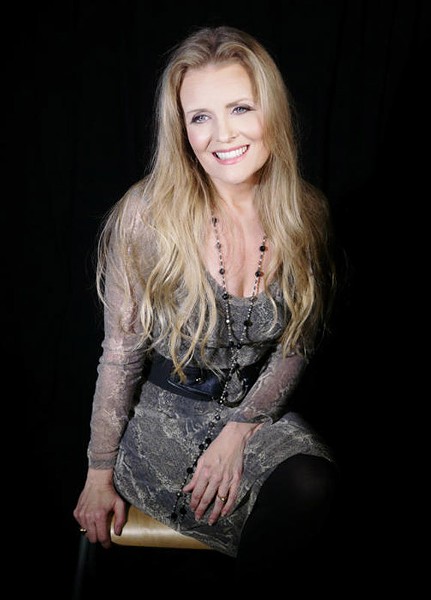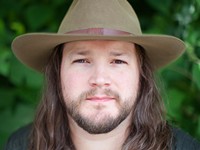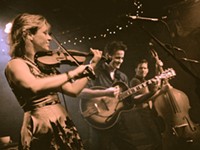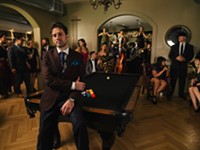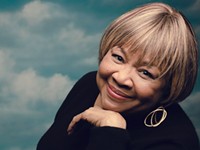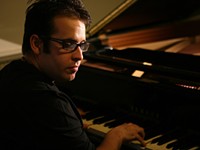When Tierney Sutton was a junior in high school, she performed a disco song in her school's talent contest. Her dad was in the audience and, Sutton recalls, he had some advice for her: "You shouldn't sing that crap," he said. "You should sing Gershwin."
So, in her senior year, Sutton sang George and Ira Gershwin's "Love Is Here to Stay." Her dad was so pleased, Sutton says, he let her know her destiny: she would be a jazz singer.
A jazz singer? Growing up in Milwaukee, Sutton had never really been exposed to jazz. She liked the Gershwin song, but had no idea it was part of the larger Great American Songbook.
"I listened to whatever dopey girls in Milwaukee listened to in the 1970's," Sutton says. "I went through an Olivia Newton-John phase and a Barry Manilow phase. And then, I remember certain things that I really, really liked and I didn't know why I liked them so much more: Steely Dan, Stevie Wonder, and Earth, Wind & Fire. The hits from those people resonated with me. The word integrity comes to mind. There was a high level of integrity that I sensed in their music."
She knew she was a good singer; she had been in musicals and operas, "but I didn't feel like I could be a professional singer," Sutton says. "I thought, 'What's the point of singing cover songs? I'm not really a writer. People are going to want to hear what they heard on the radio.'"
Her father, a civil rights lawyer, became obsessed with a performance by Sutton that he had recorded on a Dictaphone recorder. He encouraged her to try to get jobs singing, and when she graduated from high school, he made a highly unusual offer.
"He said, 'Instead of college, I'll pay for an apartment in New York so you can be a jazz singer,'" Sutton says. "It was as if he was saying, 'I've looked at the economics of it and I bet you're going to end up doing this, so why don't we skip the four years of liberal arts college that's going to put me in the poor house anyway, and I'll just pay for you to have an apartment in New York' — which in 1981, you could do. I said, 'No dad.' I didn't know what he was talking about."
Sutton went to Wesleyan University in Connecticut. "I got a degree in Russian language and literature like all jazz singers should do," says Sutton.
But Wesleyan ended up playing a significant role in Sutton's emerging interest in jazz. The head of the music department was Bill Barron, a reed player who had worked with Cecil Taylor, John Coltrane, Benny Golson, and others. He brought top jazz players to the campus.
In the summers during those college years, she got a job singing at the Heidel House Resort in Green Lake, Wisconsin. "We did tacky shows every night, but the shows had a few Great American Songbook songs in them, and every time I heard them I liked them," Sutton says. "Across the street there was a jazz trio playing, so on my nights off I'd go listen to the jazz trio. Everything they played had integrity.
"After that I felt like I had been introduced to what jazz was, and finally I had something that I thought, 'Oh, this is jazz, and I like this. This feels really solid.'"
One day at Wesleyan she saw a posting on a bulletin board advertising for a jazz singer to play gigs at a restaurant. She got the job, and would spend four or five hours on Friday afternoons going through songs in the Real Book, the well-known jazz compilation.
Even though she was learning many of these standards for the first time, they were familiar to her.
"They were in my lizard brain just from living on Earth, just from being in elevators," Sutton says. "The Great American Songbook is kind of the mortar between the bricks of all of the music that exists in the United States. There's this DNA that's in there. I learned a ton of songs."
So, despite the expertise in Russian she had attained at Wesleyan, "by the time I graduated, I realized that the CIA was not my destiny."
For most of her career Sutton relied on classic tunes for her repertoire.
"My first 10 albums were basically standards because it was very hard for me to find pop music that I could address that way," Sutton says. "There were not that many contemporary composers I felt comfortable about going for."
But in recent years she has ventured into a new territory, re-imagining the music of her own time. In 2013, she released "After Blue," an album dominated by Joni Mitchell songs.
"Joni was the first because her melodies, her harmonies, and her lyrics are of the highest integrity and the highest quality of anybody, and she has a big jazz pedigree."
On her most recent album, "The Sting Variations," Sutton explores the music of Sting, who emerged from the British new wave band The Police. Sutton points out that Sting began his career as a jazz bassist in big bands. When he left The Police and began his solo career, he hired jazz musicians like Branford Marsalis and Kenny Kirkland for his band.
She found some of his songs, like "Consider Me Gone," to be "almost blues at its core." Her treatment of "Every Little Thing He Does Is Magic" and "Message in a Bottle" make them sound like they were born as jazz tunes.
"He has that crooner thing in him as a singer, and he's got the information in his musical DNA because of how he started out," says Sutton, who will concentrate on Sting tunes during her performances at the Xerox Rochester International Jazz Festival.
Tierney Sutton will perform on Friday, June 23, at Kilbourn Hall at Eastman School of Music, 26 Gibbs Street. 6 p.m. and 9 p.m. Tickets are $35, or you can use your Club Pass. tierneysutton.com.
